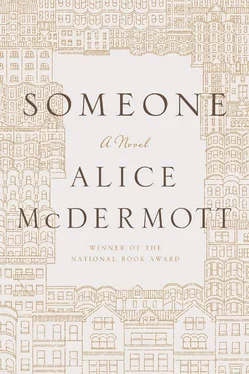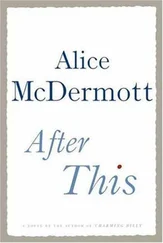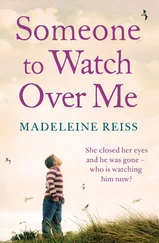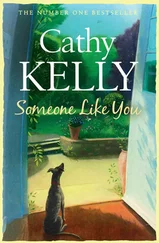He approached one of the two women sitting alone on opposite sides of the room. “Mrs. Something or other’s daughter?” I didn’t catch the name. The woman, in a blue dress and a suntan, attractive, sat up anxiously, but said, “No.” He went to the other, who was somewhat heavyset and already on the edge of her chair. “Here I am,” she said as he approached her. “Mrs. Something or other’s daughter?” he asked again. And she said, “Yes.”
“It went very well,” the doctor said. “She’s in recovery now. We’ll just monitor her a bit. Say, twenty minutes more. And then she’ll be ready for you to take her home.”
“Thank you,” the woman said.
The doctor went back through the door from which he’d come, and another door opened in the far wall and another name was called. A man this time, maybe about sixty, leaving his spouse or sister or friend behind with only a pat of the hand. Just prep right now, in fact, as the smiling nurse told him.
Not half an hour later, the doctor’s door opened again and the doctor came out, trailing his strings. He went to the attractive woman in the blue dress and asked, as if he had never seen or spoken to her before, “Mrs. So-and-so’s daughter?” and this time she said yes.
“It went very well,” the doctor said. “She’s in recovery now. We’ll just monitor her a bit. Say, twenty minutes. And then she’ll be ready for you to take home.”
He left, the nurse’s door opened again and another name was called. The old lady with the Jamaican nurse. “Just prep,” the nurse said kindly as the lady made her way through the door.
Twenty-five minutes by the clock and the doctor returned once more. “Mrs. Holybody?” or some such or other—he garbled the names—he said to the man’s wife, with only a brief, wary glance at the black girl, who was the only other person sitting alone. “Yes,” the wife said.
“It went very well. He’s in recovery now. We’ll just monitor him for a while. Say, twenty minutes. And then he’ll be ready for you to take home.”
He left. The nurse’s door opened again. By now Susan had once more dropped her magazine to her lap. I looked to her and said, “My head’s beginning to spin.” Susan said, “At least he’s consistent.”
And another daughter, whose mother was just going in (“For prep,” said the smiling nurse), looked at us both and shook her head. “It’s almost unbelievable,” she whispered.
By now the finished products, wearing plastic sun shades, were beginning to emerge from yet another door, their escorts rising to meet them with a muffled kind of joy. I was reminded of what I had observed at the airport last month, waiting for my son in the pickup lane, after my visit to Gerty in Florida: the cars would swoop into the curb and the waiting friend or relative would raise a hand from the suitcase, there would be smiles all around, an embrace, an exuberant shaking of hands, a particular kind of elation, not, I was certain, because of the reunion alone—certainly all these New Yorkers couldn’t be so fond of one another—but because of all that had been negotiated safely: the takeoff, the landing, the coordinated meeting place, the drive to the airport, because every risk had been run, every anticipated crisis had been averted, and thus something celebratory and delightful about each ordinary reunion. Something, I thought, recalling Mr. Fagin, of the resurrection and the life all about this particular bit of LaGuardia. Even Tommy, I noticed, my oldest, who had never been very demonstrative, thumped me on the back in his large embrace before he lifted my suitcase from the curb.
“Everything went very well,” I heard the doctor saying over my shoulder. “She’s in recovery now. We’ll just monitor her a little more. Twenty minutes and she’ll be ready for you to take her home.”
And then the “just prep” nurse called my name.
When my own ordeal was over, Susan rose to meet me. Less exuberant, I thought, than some of the others had been, perhaps because she was now so late to work. But in the elevator Susan said, “He knew about your detached retina, right, from back when? You told him, didn’t you?” I said, “Of course,” but I found myself slowly putting my hand to my left cheek. I recalled now that it was the cataract in the right eye he was supposed to remove. I saw my daughter raise her chin and pinch her nostrils, once, twice, although there was nothing to smell but the carpet and the bland air of the medical tower elevator. It was precisely as my mother used to do. “ ‘Cause he didn’t say everything went very well,” Susan said. I could hear her revving up her attorney voice. “He said there was scar tissue. From a previous surgery. Like it was a big surprise. He said you’ll probably need a corneal transplant, if you don’t want to lose that eye.”
In the car, Susan said again, “You told him you had that surgery, back when?”
“Of course,” I told her. “They took a full history.” I had begun to feel responsible, nevertheless, for the doctor’s mistake. Easy enough conclusion to reach when you were an old woman living on your own. Living on a ledge of this high precarious place. Perhaps I had confused left and right, as I had done so often as a child.
Susan banged the steering wheel with the palm of her hand. “Fuck,” she said. “He did the wrong eye.”
I had long ago stopped reprimanding my children for their language—quoting Mrs. Fagin with my finger raised. The world was a cruder, more vulgar place than the one I had known. This was the language required to live in it, I supposed.
Susan said, “I told you we should have gone into the city for this. These suburban doctors are money crazed. You saw how he ran the place. Like a factory.”
“I’ll have a transplant, then,” I said casually. Knowing I wouldn’t. A cornea peeled off a corpse, after all the corpses I’d seen? Not likely.
“We should take him to court,” my daughter said. “Sue him for malpractice.”
I said, “What’s done is done.”
But Susan pushed on. “I’m serious,” she said. “He clearly fucked up. And now we’ll have to find another doctor—we’re going into the city this time—and you’ll have to go through another surgery. And I’ll have to take more time off from work.” As if each item implied equal effort on all parts. “There are damages here. Seriously, we should sue.”
I was thinking of the high, precarious ledge life carried you to, the ledge you lived on when you were an old woman alone, four good children or no. I was recalling myself in that ancient city hospital with my eyes bound in tape, calling into an empty room. Not empty, though, not that time.
We were pulling into the driveway. It had been years since we had gotten rid of the carport, and yet I realized I had been anticipating getting out of the car under its shade. Easier on my eyes.
“What do you think?” Susan asked.
I was thinking of the years that had passed since we’d taken down that old carport, and how foolish I’d been to have forgotten, or confused, the time I now lived in. A notion better kept to myself. I told her, “My brother sometimes said, ‘A fool’s thoughts are in his mouth.’ I think it was from the Bible.”
“Jesus, Mom,” Susan muttered. “Don’t quote me Uncle Gabe blade, tell me what you want to do.” There was the slap and then the sharp echoing pain. A sudden stillness in the car. I had heard my children use the phrase before, joking between themselves. I knew they meant no harm. It was how they looked at the world. “Sorry,” my daughter said brusquely. “But I’m serious. What just happened to you is very wrong. How much longer do you think you’ll be able to live alone here if you lose an eye. It could start you on a real decline.” I felt her hand against my own. “I just think someone should be made to pay for all the inconvenience you’ll be put through. I seriously think you should seek some consolation.”
Читать дальше












